“Purtroppo, sì”, “Unfortunately, yes,” were the words used by the Italian Minister for the Family and Equal Opportunities, Eugenia Roccella, to answer journalist Serena Bortoni’s question “Is abortion one of the freedoms of women?” during the weekly prime-time broadcast “Oggi è un altro Giorno” on Italian public television (RAI). The Minister repeated the answer twice, with a certain insistence:
“UNFORTUNATELY, YES, UNFORTUNATELY, YES, AND IT IS NOT A GOOD THING. I DID NOT CONSIDER IT A GOOD THING WHEN I WAS FIGHTING FOR A LAW”
Eugenia Roccella, Minister of family and Equal Opportunities
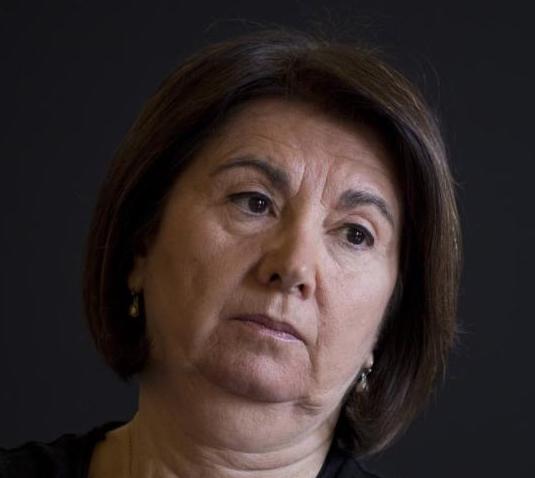
For the record, at the end of the 1970s, Minister Roccella, at the time a trade unionist and human rights activist, fervently advocated the decriminalization of abortion. She was certainly influenced at the time by her parents, who were themselves militants of the Italian Radical Party, of which her father was also a founder. The Radical Party was behind the request for a referendum on abortion at the end of the 1970s, to which we will return later in this article. Eugenia Roccella went so far as to punctuate her speech with extremely harsh words about the right to abortion:
“I LEARNED FROM FEMINISM THAT ABORTION ITSELF IS NOT A RIGHT”
According to Minister Roccella, “Law 194 (cfr: the first Italian law regulating abortion) is a good law, very balanced, which provides for example the possibility of imposing oneself as a conscientious objector”, (cfr: doctors who refuse to perform abortions) but, according to her, “women are not happy to have an abortion. Finally, she assured that Law n. 194 would not be touched by the Meloni Government and that even if she, as Minister for the Family and Equal Opportunities, personally wished to do so, she would not have sufficient powers to do so, as these powers are in the hands of the Ministry of Health.
Law n. 194 of 1978
Prior to 1978, voluntary interruption of pregnancy was considered a crime under the Italian Penal Code, punishable by a prison sentence of two to five years, imposed on both the perpetrator and the woman herself. The climate in which people lived until the 1960s was one of the obvious immorality of voluntary abortion. With the spread of feminism and a change in moral sensibility, the law on the criminalisation of abortion in Italy and the prohibitive legislation were radically modified, most certainly also as a result of the very high number of illegal abortions, which often caused serious complications and a large number of deaths in the Italian territory.
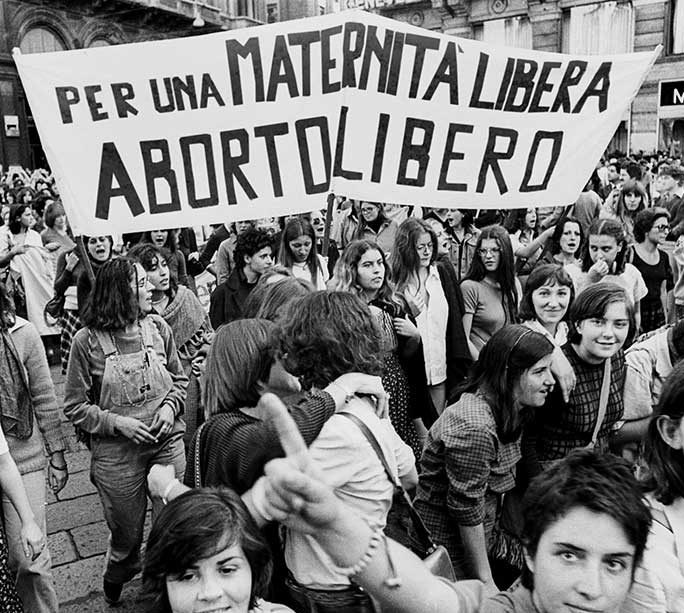 On 5 February 1976, a delegation of progressive activists presented to the Court of Cassation the request for a referendum to repeal articles n. 546, 547, 548, 549 2nd paragraph, 550, 551, 552, 553, 554, 555 of the Penal Code concerning the offences of abortion on a consenting woman, incitement to abortion, abortion on a presumed pregnant woman, sterilisation, incitement to practices against procreation, contagion by syphilis or gonorrhoea. After collecting more than 700,000 signatures, 15 April 1976 was set as the day for the referendum.
On 5 February 1976, a delegation of progressive activists presented to the Court of Cassation the request for a referendum to repeal articles n. 546, 547, 548, 549 2nd paragraph, 550, 551, 552, 553, 554, 555 of the Penal Code concerning the offences of abortion on a consenting woman, incitement to abortion, abortion on a presumed pregnant woman, sterilisation, incitement to practices against procreation, contagion by syphilis or gonorrhoea. After collecting more than 700,000 signatures, 15 April 1976 was set as the day for the referendum.
However, the referendum did not take place because the President of the Italian Republic Leone, was forced to dissolve the Chambers
 In the meantime, and notwithstanding the uncertain political context, the Constitutional Court, with the historic decision of 18 February 1975, authorised recourse to abortion on serious grounds, arguing that it was not acceptable to place the health of the woman and the health of the embryo or foetus on the same level. In 1978, the so-called “Abortion Act” (n. 194) was finally passed and approved, which regulates the legal framework, allowing women, in the cases provided for by the Act, to have recourse to abortion in a public institution (i.e. a hospital or health centre affiliated to the region to which they belong).
In the meantime, and notwithstanding the uncertain political context, the Constitutional Court, with the historic decision of 18 February 1975, authorised recourse to abortion on serious grounds, arguing that it was not acceptable to place the health of the woman and the health of the embryo or foetus on the same level. In 1978, the so-called “Abortion Act” (n. 194) was finally passed and approved, which regulates the legal framework, allowing women, in the cases provided for by the Act, to have recourse to abortion in a public institution (i.e. a hospital or health centre affiliated to the region to which they belong).
But today, what about the right to abortion and its penalisation?

In addition to an impressive number of obstetricians who are conscientious objectors, i.e. who refuse to submit to the right to abortion, which often requires women to travel long distances, sometimes even outside their region of residence, in order to be able to terminate a pregnancy, a few days ago Giorgia Meloni’s party, Fratelli d’Italia, tabled a “pro-life” bill in the Senate, submitted by its deputy Roberto Menia. The aim of this bill is “to declare that every individual has legal capacity as an individual, i.e. that legal subjectivity is born from conception and not from birth”.
“If this were to become law, an embryo and a fetus would have the same rights as a man and a woman”, said Giulia Crivellini, Lawyer and Treasurer of the Italian Radical Party
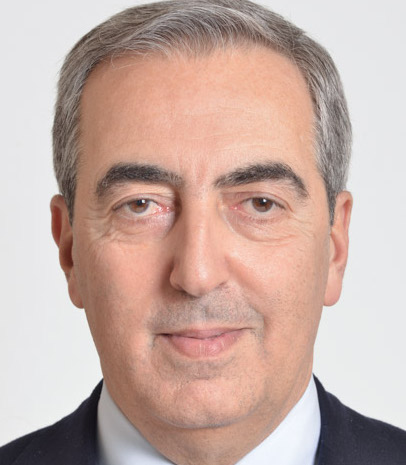
As a reminder, the Radical Party was the incubator of the first texts concerning the decriminalisation of abortion. According to Crivellini, this would be another shortcut to “dismantle” Law 194. And, she insisted fervently, “in political and legal terms, this bill equates women who want to terminate a pregnancy with potential murderers”. However, long before the proposal by Roberto Menia, it was on the initiative of Senator Maurizio Gasparri of Forza Italia, Silvio Berlusconi’s political party, that a first bill was tabled last October to amend Article 1 of the Civil Code, which states that legal capacity is acquired at birth. The head of the parliamentary group of Matteo Salvini’s Lega party, MP Massimiliano Romeo, had also presented a draft law which provides that “the embryo conceived may be recognised as a member of the family, for all purposes”.
Also last November, the Fratelli d’Italia MP, Isabella Rauti, tabled a bill instituting a “Day of Born Life”
Because the right to abortion should be part of women’s freedom, without any doubt or concession, however, as we have previously pointed out, Minister Roccella prefers to create controversy by stating that abortion “is unfortunately part of women’s freedom”, instead of dealing with the innumerable obstacles that prevent the application of Law n. 194. Indeed, on the one hand, the Meloni government pretends not to want to infringe the right to abortion, but on the other hand, it does not lift a finger to address the obvious critical issues.
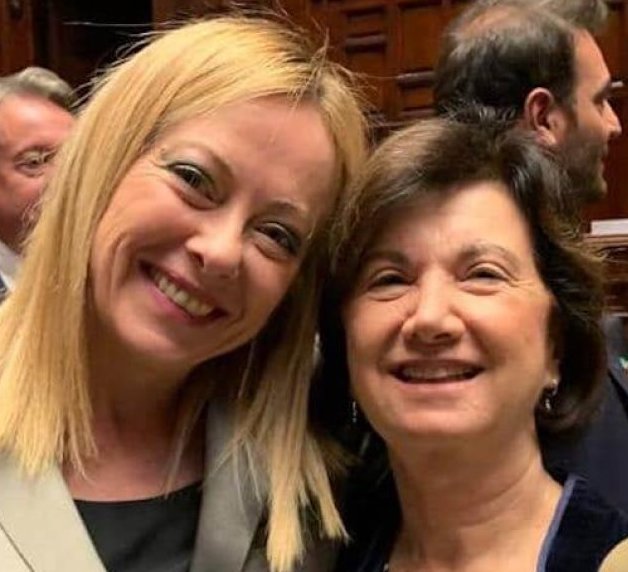
In her policy note, Giorgia Meloni said: “We want to give women who think that abortion can be the only choice, that they also have the right to make a different choice. But in reality, this is not the case, women really cannot choose, and this is something that Minister Roccella and the whole Executive know very well: Law n. 194 is unfortunately only very hardly applied, and the government does not care about it. In many regions of Italy, women do not have the possibility to terminate their pregnancy or find it difficult to do so in time, as hospitals do not always guarantee the presence of health personnel who are not opposed to the termination of pregnancy. This is the case, for example, in Calabria, at the hospital in Cosenza, where since last summer there has not even been a non-conscientious objection doctor in the gynaecology-obstetrics department.
Faced with such dysfunctions, it is not always possible to find alternatives, due to a chronic shortage of medical staff
Conscientious objection
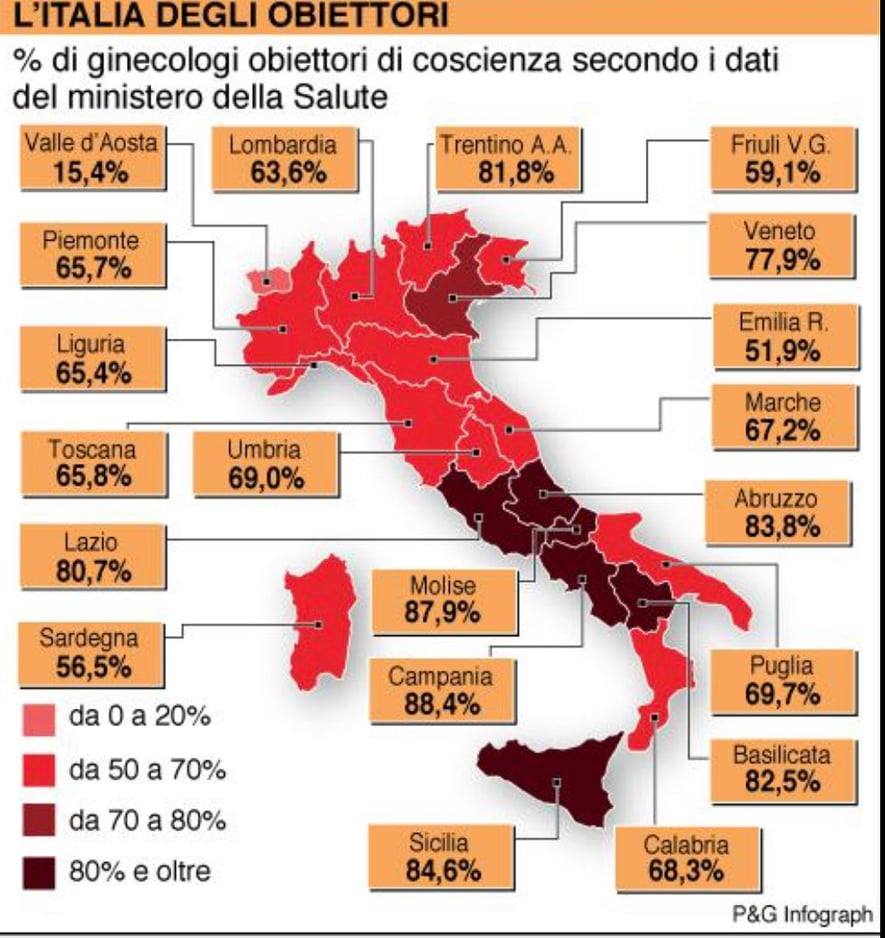 Law No. 194 should guarantee, in addition to the right of doctors to conscientious objection, the main right of women, of all women, to be able to terminate a pregnancy. Two rights that should be complementary in themselves, but which in reality are in antithesis, in a situation where sometimes all the doctors in the approved structures are objectors, without exception. Moreover, it is no mystery what happens in hospitals, where women who wish to have an abortion, instead of being welcomed and accompanied, are often discouraged and also encounter difficulties in obtaining a certificate of termination of pregnancy, which should simply certify a person’s wish to have an abortion.
Law No. 194 should guarantee, in addition to the right of doctors to conscientious objection, the main right of women, of all women, to be able to terminate a pregnancy. Two rights that should be complementary in themselves, but which in reality are in antithesis, in a situation where sometimes all the doctors in the approved structures are objectors, without exception. Moreover, it is no mystery what happens in hospitals, where women who wish to have an abortion, instead of being welcomed and accompanied, are often discouraged and also encounter difficulties in obtaining a certificate of termination of pregnancy, which should simply certify a person’s wish to have an abortion.
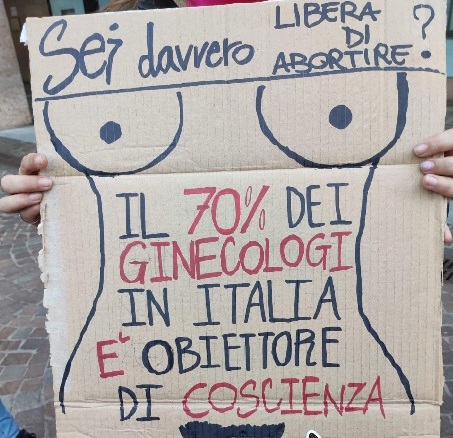 Law No. 194 (Article 9) is very clear on this point: conscientious objection exempts health personnel and personnel performing related activities from performing acts and activities specifically and necessarily aimed at inducing the termination of pregnancy, and not from providing assistance before and after the procedure. What the Government should do today, instead of denigrating or blaming the free choice not to continue a pregnancy, is rather to make public all the data on the real application of Law n. 194 and on the number of conscientious objectors in Italy, in order to identify the real anomalies and intervene rapidly to correct them.
Law No. 194 (Article 9) is very clear on this point: conscientious objection exempts health personnel and personnel performing related activities from performing acts and activities specifically and necessarily aimed at inducing the termination of pregnancy, and not from providing assistance before and after the procedure. What the Government should do today, instead of denigrating or blaming the free choice not to continue a pregnancy, is rather to make public all the data on the real application of Law n. 194 and on the number of conscientious objectors in Italy, in order to identify the real anomalies and intervene rapidly to correct them.
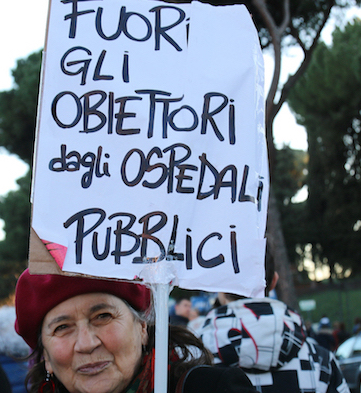 The government’s attitude is unforgivable: on the one hand, pretending not to tackle the right to abortion, but on the other, not lifting a finger to solve the problems that prevent Italian women from being able to exercise their choice freely. In a European democracy, abortion should remain an integral part of women’s fundamental freedoms, simply because it is established by law. Statements such as those made by Minister Roccella should not be part of the repertoire of a democratically elected government
The government’s attitude is unforgivable: on the one hand, pretending not to tackle the right to abortion, but on the other, not lifting a finger to solve the problems that prevent Italian women from being able to exercise their choice freely. In a European democracy, abortion should remain an integral part of women’s fundamental freedoms, simply because it is established by law. Statements such as those made by Minister Roccella should not be part of the repertoire of a democratically elected government
Alessandra Moretti, MEP for the Italian Democratic Party

“Europe and the European Parliament are very careful, vigilant and strict in enforcing the respect of the State of D in European countries, knowing full well that some of them, such as Hungary or Poland, violate and flout every day the rights of minorities, such as those of homosexuals, or attack the right to terminate a pregnancy, even going so far as to ban it. In Italy, as the Democratic Party and as the first opposition force in the Parliament and in the country, we will be intransigent, severe and we will defend acquired rights such as civil union or the right to abortion. “A first bill has already been tabled under the signature of Senator Maurizio Gasparri of Forza Italia to modify Article 1 of the Civil Code by attributing legal capacity to the child conceived and not to the child born. This is an indirect attack on Law n. 194, because if this law were to be passed, the woman who decides to terminate her pregnancy and the doctor who supports her in doing so could be accused of murder, since in this case legal capacity could be attributed to the unborn child.
I believe that on these issues there will not only be the commitment of the Italian Democratic Party in Parliament, but also the attention of the whole civil society
 I think that not only should we not go back on Rights, but on the civil Rights of man, on the Rights of women, we should all be equal in a certain way and maybe on this we should be a little more attentive, as it is the case in the Northern European countries where the policy debate is not about the question of Rights, which is an acquired one, but rather about labour policies, about economic strategies, about social measures, about how to reduce, for example, the high bills. I think these are the issues that politics should focus on and certainly not on issues related to Rights, which, I repeat, should be rights defended by all, not only by some political actors.”
I think that not only should we not go back on Rights, but on the civil Rights of man, on the Rights of women, we should all be equal in a certain way and maybe on this we should be a little more attentive, as it is the case in the Northern European countries where the policy debate is not about the question of Rights, which is an acquired one, but rather about labour policies, about economic strategies, about social measures, about how to reduce, for example, the high bills. I think these are the issues that politics should focus on and certainly not on issues related to Rights, which, I repeat, should be rights defended by all, not only by some political actors.”
Luisa Betti Dakli, Investigative journalist on Human Rights, Director of the magazine DonnexDiritti / International Women and Head of the Equal Opportunities Commission of the Order of Journalists (Lazio)

For the first time in Italian history we have a female Prime Minister, but this does not reassure us at all. Giorgia Meloni represents the dark side of a woman fascinated by power who, in order to achieve it, denies herself and her gender, trying to look like a male counterpart. What makes her even more dangerous is this devious attempt to demonstrate that women have more opportunities for a political career in right-wing parties than in left-wing ones, thus justifying their extremist movement with misogynistic values, which do not challenge the patriarchal structure of society at all, but on the contrary vigorously support it. Meloni is indeed a far-right leader who has kept the tricolour flame in her symbol: fascist values where the ‘traditional family’ is the backbone of society and civil rights are completely nullified. One of the first clear acts of its intentions was to change the name of the Ministry of Equal Opportunities to “Family, Natality and Equal Opportunities” and to appoint Eugenia Roccella as Minister: a former feminist turned ultra-Catholic fanatic who was already the spokesperson for the first Family Day, who then moved to the ranks of Fratelli d’Italia and is now openly opposed to abortion.
Not only because in his speech of confidence in the House, Meloni declared that he had named “talented” women, thanking them and calling them by their first names, thus keeping them anonymous and ridiculous

A speech in which all the other women, the feminists who have worked so hard to pave the way for the next ones, including her own, were deliberately ignored in order to emphasise that if one gets to the top it is only thanks to her individual merit because she is “better than the others”. A reasoning that sweeps away years of struggle and a fundamental concept for women’s emancipation: sisterhood. All this in a way that completely excludes a link with gender equality, even declaring that difference is only an obstacle and that the role she has today depends only on her “ability”, Meloni went so far as to table an internal circular at Palazzo Chigi requiring her to be called “Mr. President of the Council of Ministers”, thus annulling the work of countless years on inclusive language and erasing in a single moment the female identity in the political top management.
A glass ceiling that not only has not been broken in Italy, but is being solidified by a woman who does not recognise absolutely herself among other women
 The greatest fear for women’s rights is therefore that they could be swept away by a far-right government of a fascist nature, which has been working in this direction for years. Just look at the countries that Meloni calls his friends, such as Hungary or Poland, where serious restrictions call into question the very concept of Democracy: countries where women can die while waiting for a therapeutic abortion, where anti-violence centres are criminalised, and where the signing of the Council of Europe Convention to combat violence against women and domestic violence, renamed the Istanbul Convention, has simply been withdrawn. A big step backwards that we will certainly take in Italy too, given that Meloni only notices gender-based violence when it is perpetrated by migrants, which is only 15% of violence, whereas 80% is domestic violence: a weak point given that it undermines the model of the perfect, untouchable traditional family that Meloni has always wanted to advocate as the only model to follow and promote.
The greatest fear for women’s rights is therefore that they could be swept away by a far-right government of a fascist nature, which has been working in this direction for years. Just look at the countries that Meloni calls his friends, such as Hungary or Poland, where serious restrictions call into question the very concept of Democracy: countries where women can die while waiting for a therapeutic abortion, where anti-violence centres are criminalised, and where the signing of the Council of Europe Convention to combat violence against women and domestic violence, renamed the Istanbul Convention, has simply been withdrawn. A big step backwards that we will certainly take in Italy too, given that Meloni only notices gender-based violence when it is perpetrated by migrants, which is only 15% of violence, whereas 80% is domestic violence: a weak point given that it undermines the model of the perfect, untouchable traditional family that Meloni has always wanted to advocate as the only model to follow and promote.
 A right-wing wind is blowing and is being felt throughout Europe, as shown by the advance of Vox in Spain, which has already called for the country’s withdrawal from the Istanbul Convention, and above all the recent victory of Jimmie Akesson’s pro-Nazi party in Sweden, which, in addition to finishing second, has allowed the right to return to government after 70 years of social democracy.
A right-wing wind is blowing and is being felt throughout Europe, as shown by the advance of Vox in Spain, which has already called for the country’s withdrawal from the Istanbul Convention, and above all the recent victory of Jimmie Akesson’s pro-Nazi party in Sweden, which, in addition to finishing second, has allowed the right to return to government after 70 years of social democracy.
_______________________
This article on europeantimes.news wrote by Aury Colombo with the collaboration of Alessandra Moretti, Member of the European Parliament of the Italian Partito Democratico, and Luisa Betti Dakli Investigative Journalist, Director of the magazine DonnexDiritti / International Women and Head of the Equal Opportunities Commission of the Order of Journalists (Lazio). This article is also available in French on almouwatin.com




 This is the english section of
This is the english section of 